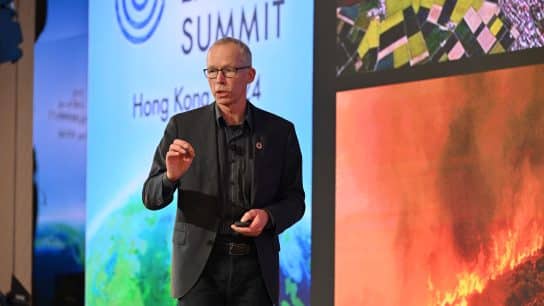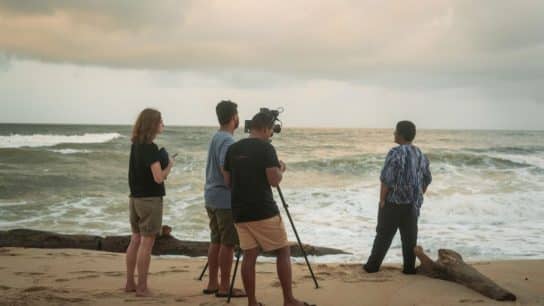In an exclusive interview with Earth.org, Vipop CEO’s Lenia Perez discusses the devastating environmental impacts of the fast fashion industry, why sustainability matters and how her company is working to improve the sector while simultaneously empowering women and promoting diversity.
—
Between 2000 and 2015, clothing production has doubled from 100 to 200 billions units a year. Simultaneously, garment usage lifetime has decreased by 36% overall – and of all fashion items discarded, only a very small portion is recycled, leading to more than 90 million tons of clothes-related waste each year estimated to be worth about US$500 billion.
The environmental impacts fast fashion generates stem from a variety of factors, from the monstrous amount of water required for production – around 93 billion cubic metres annually – to textile dyeing, which is responsible for about 20% of global wastewater.
Nowadays, the fast fashion industry generates more emissions than the aviation and shipping industries combined – the equivalent of about 10% of annual global carbon dioxide output.
You might also like: The 10 Essential Fast Fashion Statistics
Online shopping has revolutionised the industry and brings an added $26.7 trillion in profits each year. But between over-packaging and the energy required to ship goods across the globe have only added to the sector’s environmental footprint.
As consumer’s expectations in terms of price, speed, and convenience rise, the fast fashion industry is set to keep growing at an unprecedented rate in the coming years, with related emissions expected to increase by 50% by 2030.
Fast fashion is both an economic and sociological phenomenon that has grown to epic proportions. What we cut in costs for garments is borne twice over by the planet, but with the climate crisis worsening day by day and experts warning that we are running out of time to reverse the course, it has become more important than ever to change our regulations and behaviours and turn to more sustainable options.
We spoke about these issues with Lenia Perez, CEO of Vipop. With values such as sustainability, quality, and craftsmanship at heart, the Hong Kong-based fashion brand is dedicated to “shining a light on sustainable handcrafted works in consumer fashion.” They work with international artisans whose products and businesses reflect these values in a bit not only to “evoke a feeling of change and opportunity for both sides of the industry: designers and consumers.”
Lenia Perez on Sustainability in Fashion
EO: What inspired you to launch Vipop, a company with sustainability at heart?
Perez: There is no doubt that the world is changing for the better. But it is not always easy to know how to make a difference, especially when it comes to things like fashion. That’s why we’re here: to share with you that sustainable fashion isn’t just possible – it is also fun and feels good! You can still look stylish and feel comfortable in the clothes you wear while doing your part to help the environment.
Our mission at Vipop is to connect with sustainable fashion lovers worldwide and showcase sustainable and ethical designer clothing. We believe in long-lasting fashion, which means less waste and more value for your money.
We also believe in fair labor practices, which means our designers pay their workers fairly, so you can feel good about where your money is going when you purchase something from us.
EO: What are the challenges of the fashion industry and in what way does Vipop address them?
Perez: It is very hard nowadays to find sustainable brands that are sustainable and sell attractive and unique products. The industry is known for generating a lot of waste and is often associated with the workers’ exploitation, but there are many wonderful brands out there who put sustainability first and design beautiful pieces. We just want to show to our clients that they have options that do not compromise the style while trying to reduce their environmental footprint.
At Vipop, we choose our partners carefully and do extensive research before we decide to work with them. We try to dig in as deep as we can and we have support for creating a ranking system that we can keep using to evaluate our designer’s performance over time. We aim to grow together with our designers. Sustainability is a marathon, not a sprint. We also extensively dedicate our time to look for designers to work with that reflect our values and meet certain standards we have set for ourselves. This way, we are able to make sure that the sustainability claims that brands make are actually authentic – and that they are worthy of representing our mission.
You might also like: 18 Sustainable Fashion Brands to Support in 2023
EO: What criteria do you use when it comes to selecting artisans to partner with?
Perez: We look for a few key things.
Firstly, we do research on the artisan’s speciality. This can be an ancient technique or a more modern one – we are interested in all sorts of artistic approaches as long as they are sustainable and environmentally friendly. We also consider their aesthetic and style preferences, so that we can make sure our products will appeal to our customers.
Finally, we ask about their sustainability practices as a brand. Do they use natural materials? Do they employ local people? Do they have any research programmes in place?
EO: What’s the role of women in fashion and what are the reasons behind VIPOP’s all-female team?
Perez: Women are naturally more in tune with the aesthetics of fashion, and they have a heightened sense of sensitivity when it comes to where their clothes come from. This is because women have been historically less empowered than men, and this has led them to become more aware of the unfairness that surrounds them.
Vipop’s founders happen to be women that care about empowering other women and things just progress in this direction. We welcome men that are interested in conscious fashion, too. We will always want to help level the playing field for future generations. We want all our employees to feel like they have got an equal shot at success and we want our customers to know that we take diversity seriously.
You might also like: Fast Fashion and Its Environmental Impact


















